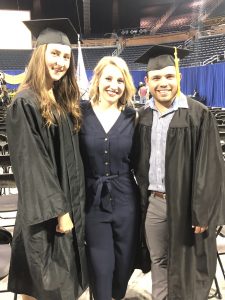 By Ashley Korn, Academic Counselor, U-M Athletics Academic Success Program
By Ashley Korn, Academic Counselor, U-M Athletics Academic Success Program
As an academic counselor, every four (or five) years you pat your seniors on the back, say goodbye, maybe shed a single tear and cross your fingers that at some point they actually took your advice and are in some way, shape or form ready to take on life after college.
When I send off these seniors, I rarely worry about their GPAs, salaries, or grad school admittance, but more about how they are going to leave their student-athlete identity behind. The idea of no longer being a student-athlete is something no one can truly prepare you for.
Whether you’re going on to start your career, begin grad school or even go pro in your sport, your college self becomes a thing of the past. That false sense of adulthood becomes real: it’s no longer acceptable to wear leggings everyday (unless you’re really lucky), you can’t tear through grab ‘n’ go like a grocery store, falling into a deep Instagram vortex is now part of your post-work plans, and “I can’t, I have practice, or a tutor, or treatment” is no longer a valid reason to get out of whatever it is you don’t want to do.
For some, the allure of a new job, new people, new places, new wardrobes can create a (moderately) healthy distraction from the fact that this piece of yourself has gone missing, but what happens when the proverbial dust settles?
Often when I check in with my now former student-athletes, I’ve come to learn that there are some “staples” to the transition out. Much like their undergrad experience, I’ve discovered that there isn’t any one thing that I can do or say that is going to make this feel better, but I know that if you embrace the fact that life is going to be weird without the structure of college athletics, it’ll make adulthood feel a whole lot easier.
I understand that everyone is unique and the demands of whatever your “first year out” looks like are going to be vastly different than some of your teammates. Nevertheless, I’ve learned a few things–both from my own experience and the experiences of former student-athletes–that have seemingly helped people to get used to this “new normal” that is post-grad life.
there isn’t any one thing that I can do or say that is going to make this feel better, but I know that if you embrace the fact that life is going to be weird without the structure of college athletics, it’ll make adulthood feel a whole lot easier.
Housing & Roomies
As a student, you likely lived with at least one to six other humans in an average at best kinda place. This was great…in college.
Once you graduate, you should be thoughtful about your roomie situation and what kind of place you choose to live. For some of you, the roommmates are going to be your parents and there is nothing wrong with that (here’s to saving a little money!).
For those in the market for a new place to live, I highly recommend you take time and care into where and who you’re living with. Why? Because post-grad life isn’t like an episode of Friends (I mean really, how could they afford that place?!).
If you try and live like you did in college, with all your best friends in a questionable place, you’ll likely act like you’re still in college. Keep the roommates to one or two max; buy some new furniture, decorate your walls without sticky tack, have a real kitchen and learn how to really do the dishes. If you have a shoddy kitchen, you’ll eat out more often and subsequently spend more money.
Now I realize that if you’re moving to a place where the cost of living is high, you might not be able to find a quality place like Rachel & Monica but you likely learned in college a good lesson in how to use your resources, so put that to the test. Ask teammates who know people, perhaps from other teams (both at your school and at others), who might be moving too. Use the right kind of websites and see what options are out there. You might even make some new friends in the process!
Fitness
Here’s the deal, you’re likely going to embrace not having to be “fit” for your sport anymore. But what you will learn is that fitness is likely a part of you and you shouldn’t let that go.
The endorphins that you’ve been releasing through sport, almost everyday for the entirety of your life, shouldn’t just stop. Instead, find a new method. You’re not going to have a strength coach handing you a workout to do every time you walk into the gym. This was probably my biggest battle. I needed someone or something to guide me because otherwise I would just do the same thing over and over again.
Now I’m not saying you should go join a CrossFit gym immediately, but do your research to see what kind of place or what app might be a good fit for you. Reach out to your strength coach for some ideas, and/or find a workout buddy to help keep you motivated now that you don’t have designated times to show up to lift.
 Stay Competitive
Stay Competitive
We know it’s hard to give up your sport let alone that competitive nature that you feel towards it. What I’ve seen a lot of people do to not only fuel that competitive spirit, but also make new friends, and stay active is to join some rec leagues like slow pitch softball, kickball, basketball or volleyball.
I know that I personally would not thrive in this setting, especially because I was a figure skater and, well, hand-eye coordination is not my jam, so instead of joining a league, I went into coaching. I started casually with youth organizations and “learn to skate” programs and then ventured into more competitive divisions/levels. There are lots of different ways to get creative with how to stay involved in competition, you’ll never know what new opportunities it might bring.
Nom, Nom, Nom
Listen, I’m all about food but I learned the hard way that I don’t need to eat nearly as many carbs as I did when I was a competitive athlete. It’s hard to make the adjustment from what you needed to eat to fuel your body when you were competing to being “NARP.”
I am no dietician (I sure didn’t handle the transition well), but there are people that can help. If your school has a dietetics staff, make that part of your exit to post-grad life or reach out to them. I can guarantee they’re willing to help.
In post-grad life, food becomes one of those things that becomes central to the social scene: “let’s go grab dinner! Happy hour there is so cheap! Oooh, we have to go to that new ice cream place” …these are things you’ll hear at least one to five times a week and with that, you should start to understand your relationship with food, and more importantly, alcohol.
A lot of times socializing centers around alcohol. It is something to be aware of, especially if you’re struggling with this whole transition out of college. I am a realistic person and know that many of you will still try and go out like you did in college for at least a few months (some of you…maybe longer) but this is going to get old. Be aware of what you’re drinking and how often you’re doing it because it’s important to develop healthy habits early.
Stay Connected
College is one of the last times you’re going to be with a large cohort of people that are all essentially at the same place in their lives where you’re attending classes, training, competing, and deciding what you’re doing on Friday night.
In essence, it’s one of the last times you get to live without formal “obligations” (they seem like obligations now, but you’ll learn in post-grad life that deciding what tailgate to go to on gameday is really inconsequential).
After you graduate, real world obligations take over and you suddenly lose that ease of planning and the concept of spontaneity. Your friends are suddenly getting new hobbies, have prior commitments, are getting engaged, married or having babies…it’s hard to fathom now, but trust me, it’s the reality.
This change will occur at different times for everyone, it may be one year post college or it may be five or more. This can often lead to feeling isolated and confused about what having a social life really means. This means that staying connected with your friends becomes all the more important.
Checking their insta stories and tweets doesn’t necessarily qualify as “staying connected” but actually calling them should become a thing. You won’t text your BFF’s everyday and those GroupMe’s won’t be as active in about four months.
These are harsh realities about post-grad life, and if you go to grad/professional school, you’ll get a whole new group of people to share these experiences with, but then you’ll cycle back through that same feeling. It’s hard and that’s the honest truth. If you land in a place with former teammates, you might navigate this a little easier, but you’ll soon realize that you’re not always going to be the same person you were when you were in college, and that’s a good thing.
Everyone will navigate this timeline at their own pace, but just being able to have those relationships are critical to helping you make sense of this experience.
Whether it’s by choice or something outside your control, leaving behind your college self as a student and/or athlete is something that takes great awareness. I am by no means an expert to that post-grad life, but I have been fortunate enough to graduate student-athletes and watch them, for better or worse, navigate this transition out of student-athlete life.
Being a student-athlete, no matter which institution you attended, gives you more skills to cope than you likely even realize. Your ability to fail, to work with others, to have small wins, to be dedicated to something, to focus, to fight, all mean you’re going to be prepared for life after being student-athlete it will just take some adjustments, and that is just fine.
 About the Author
About the Author
Ashley Korn has been an academic counselor at Michigan since 2013. Currently she works with student-athletes from baseball, ice hockey, men’s and women’s golf, men’s soccer and women’s rowing. Korn earned her B.S. in journalism and speech communications, and Master’s in student affairs in higher education at Miami University in Oxford, Ohio.
Additional Resources
